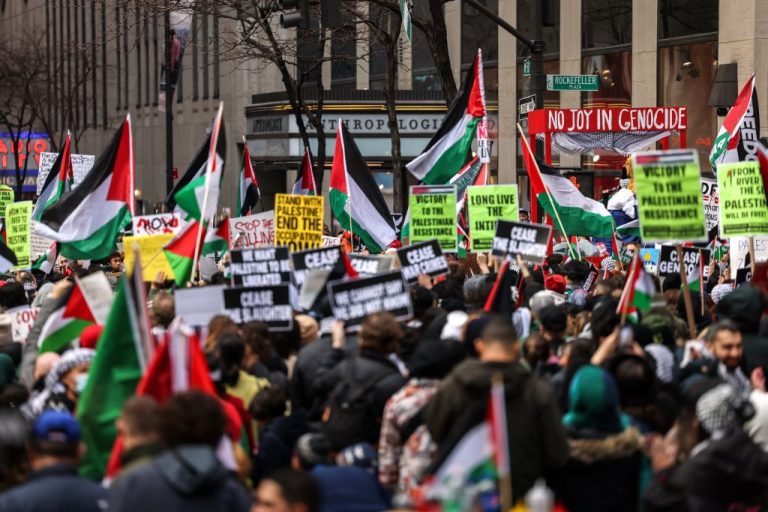On Dec. 25, demonstrations by pro-Palestine protesters in the city ended with multiple arrests and at least one member of the New York Police Department (NYPD) suffering a minor injury, prompting authorities to openly worry that protesters will attempt to disrupt the city’s New Year’s Eve celebrations.
The protests have been a regular scene on New York City streets following Israel’s retaliation for Hamas’ terrorist attack on Oct. 7.
On Christmas day, an estimated 500 protesters gathered outside the Fox News headquarters on 6th Avenue in Manhattan around mid afternoon, before making their way to 5th Avenue in an attempt to disrupt the Rockefeller Center Christmas tree lighting.
Protesters chanted “Christmas is canceled” and carried a mock nativity scene as they called for a cease fire in the conflict between Hamas and Israel.
Of the hundreds of protesters a small number clashed with police as the crowd made their way to Union Square, prompting the NYPD to briefly raise its level of mobilization to “level three”, the department’s second highest alert.
Success
You are now signed up for our newsletter
Success
Check your email to complete sign up
According to an NYPD spokesperson, in total, four men and two women were charged with offenses including disorderly conduct, resisting arrest, criminal mischief, and menacing, among other charges.
According to the New York Post, “Most of them were given desk appearance tickets and released.”
READ MORE:
- Who’s Responsible for the Hamas-Israel Conflict?
- NY: Lee Zeldin Teams up With Arctix to Distribute $5 Million In Winter CLothing to the Homeless
- A Decadent Adventure at the Sugar Factory in Times Square
NYPD brace for New Year’s Eve disruptions
On Dec. 26, during a briefing at City Hall, Mayor Eric Adams said the NYPD will be mobilizing more security for this year’s New Year’s Eve celebration in Times Square.
Hizzoner said that there have been nearly 500 protests in the city since the Israeli-Hamas conflict began and that the city is bracing for at least one more before the year is over.
Every year, thousands of New Yorkers and tourists gather in Times Square for the annual ball drop, making security difficult.
“It’s a real Herculean task to manage that number of people without being heavy handed but being protective,” Adams said.
During the briefing, Adams did not reference any particular threat but said, “There’s an added concern because of some of the protests you have been seeing, and there was an attempt to disrupt the tree-lighting, and we’re sure that there’s going to be some type of attempt this year to use that stage for some other concerns that people are having.”
Last year’s ball drop was marred by violence after a man attacked two police officers with a machete. Both officers survived the attack and the perpetrator is now facing terrorism charges after he allegedly said his motive for the attack was to wage “jihad” on the United States government.
When asked if the city is aware of any planned attacks on the celebrations this year, Adams told reporters, “If we did, we wouldn’t mention that.”
READ MORE:
- Accommodating Migrants a Concern for an Overwhelming Number of New Yorkers: Quinnipiac University poll
- ‘Timeless treasures await you’: New Middletown Department Store Celebrates Its Grand Opening
- Support for Trump Grows as Biden’s Approval Drops, WSJ Survey Finds
Adams backtracks
This year’s New Year’s Eve celebrations will be the first following a court settlement last fall that requires the city to deploy fewer officers to most public protests and that banned the NYPD from utilizing a controversial tactic called “kettling,” that involves trapping and arresting large groups of protesters.
The settlement, which Adams initially voiced support for, was as a result of a lawsuit filed by Black Lives Matter protesters who alleged that their First Amendment rights were violated by the NYPD during protests that erupted in the city in the summer of 2020 following the death of George Floyd.
On Tuesday however, Adams voiced concerns that the protest restrictions will make it difficult for the city to respond to disruptions.
“I thought it put us on a very troubling direction, and now you’re seeing it: You see 1,000 people go to Grand Central station, decided they want to just close down Grand Central station or they want to sit in the street in front of Times Square,” adding that, “I don’t believe that people should be able to just take over our streets and march in our streets. I don’t believe people should be able to take over our bridges. I just don’t believe you can run a city, this complex, where people can just do whatever they want.”
Adams’ chief counsel, who was at the briefing, said the settlement does include “a tiered system for responding to protests.”
“So there’s a lot that depends on the circumstances. It does not allow protesters to block access to critical infrastructure … I just want to be clear on that,” she said.















